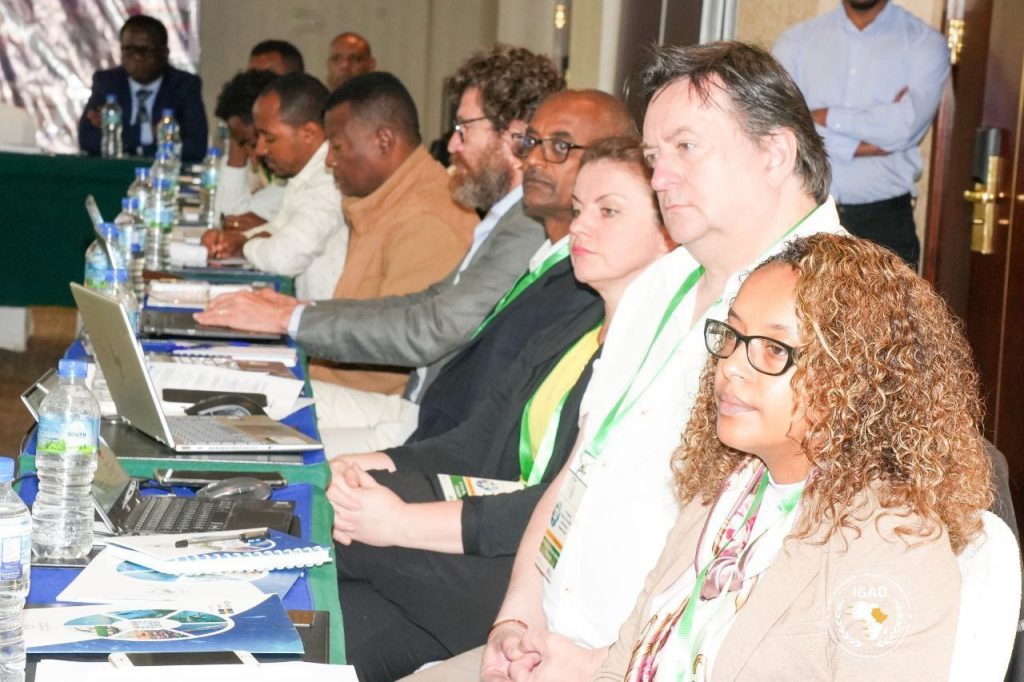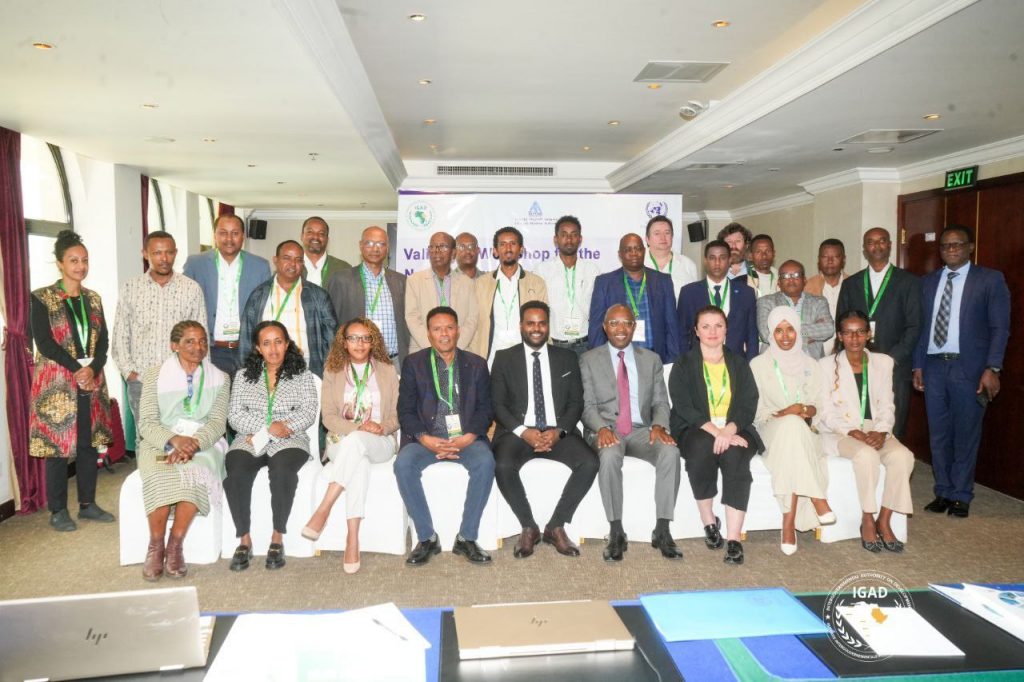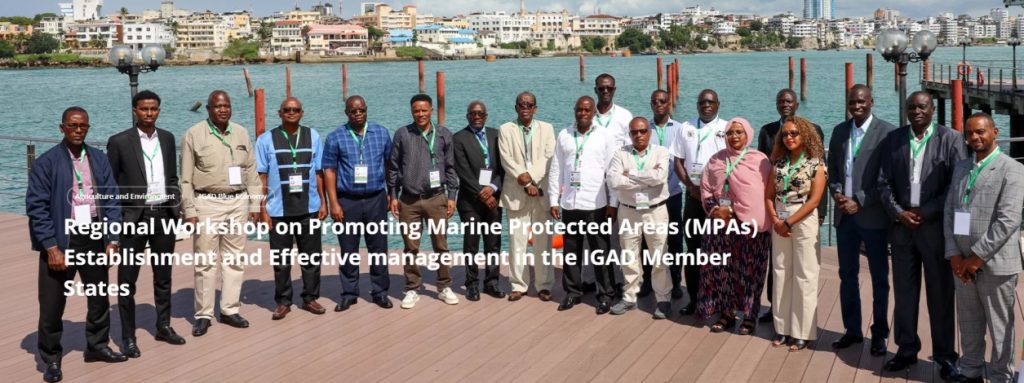It was stated that Ethiopia has potential in the blue economy sector.

Ethiopia has an untapped potential in the blue economy sector and to use it, stakeholders reviewed the action plan to help implement the strategy by preparing a blue economy strategy on July 08, 2024.
The forum was jointly organized by IGAD, the Economic Commission of the European Union and the Ethiopian Maritime Authority.
Abdulber Shemsu (Engineer), the Director General of the Ethiopian Maritime Authority, who made the opening speech at the forum, said: Ethiopia has an untapped potential in the blue economy sector and the authority is working to make use of it.


In this forum, IGAD presented the activities being done to increase the use of the Blue Economy in the countries of the region, as well as the Ethiopian Blue Economy Strategy (2023-2027), and the action plan to help implement the strategy and the economic, social, and ecological benefits of the Blue Economy were presented in detail.
The contributions of the Blue Economy to Ethiopia’s economy through job creation; Dr. Asya Maskev, the African consultant of the European Union’s Economic Commission, said that the sector contributes to the country’s GDP and that it can contribute even more if it is paid attention to.
Ideas that should be included in the proposed action plan were presented by the participants.

Finally, IGAD stated that it will play its part so that Ethiopia can benefit from the blue economy sector, and the Deputy Director General of the Ethiopian Maritime Authority, Mr. Firaol Taffa, said that the institution led by the Ethiopian government is paying great attention to the blue economy sector.

Source: Ethiopian Maritime Authority, Official Telegram Group page.
Regional Media Training for Blue Economy Experts and Journalists

February 11, 2024 (NAIROBI, Kenya): The Intergovernmental Authority on Development (IGAD), through its Blue Economy project financed by the Government of Sweden (SIDA), organized a media training event in Nairobi, Kenya, from February 6th to 8th. The objective of this training was to enhance sustainable Blue Economy advocacy and awareness creation in the IGAD region, bringing together Blue Economy sector experts and journalists from all IGAD Member States.
Since Blue Economy is an emerging concept, in order to improve its visibility in the IGAD region and its contribution for socio-economic development, the IGAD Blue Economy Project, organized a 3 days media advocacy training from May 30 to June 1, 2022 in Nairobi. Following this initial training, the primary recommendation emphasized the need for a more deepened and practical communication training targetingBlue Economy experts and communication personnel from Blue Economy ministries and journalists across IGAD Member States.
The Director of Agriculture and Environment Division, Mr. Daher Elmi, on behalf of H.E. Dr. Workneh Gebeyehu, Executive Secretary of IGAD, highlighted in his opening remarks that IGAD Member States have a great Blue Economy potential that is overall under used. He also emphasized the potential of sustaining Blue Economy in livelihoods and job creation.
The training was officially opened by the Acting Fisheries Director, Mrs Luciya Akinyi Ouma, State Department for Blue Economy and Fisheries, Kenya. She stressed how the Government of Kenya is committed to sustainably develop the Blue Economy of the country. She mentioned that Kenya took the initiative to organize the first ever global Sustainable Blue Economy Conference in 2018. Finally, she appreciated IGAD’s support through the SIDA Blue Economy project for the sustainable Blue Economy development in the region.
Trainees had mock practical sessions of live interview on how to focus on key messages, the application of the art of using bridging technique and handling ambush interviews or crisis situations.
At the conclusion of the training ended, the recommendations of the way forward are:
- Participate actively in the IGAD Blue Economy Experts Platform social media group,
- Public Relation Officers in the Blue Economy sectors to work closely with Blue Economy Experts to create awareness about Blue Economy
- Journalists to work closely with the experts in the Blue Economy sectors to create mass awareness using media as a tool
- IGAD and Member States to organize campaigns such as plastic pollution control to create awareness in the coastal and riparian communities.
The Training was held with financial support from the Sweden Government (SIDA) under the IGAD Project “Enhancing Blue Economy in the IGAD Member States for Biodiversity Conservations and Livelihood Diversification”.
Source: Official IGAD web site
According to the World Bank’s definition, the Blue Economy means that the ocean/water body is used sustainably for economic growth/development, the improvement of people’s living standards, and the creation of job opportunities. Economy is the” sustainable use of ocean resources for economic growth, improved livelihoods, and jobs while preserving the health of the ecosystem).
Land locked countries are victims not because they do not have landlocked countries, but because they have not designed and implemented a program based on international law that makes them unable to use the untapped potential resources of the blue economy.
It can be seen that there are many sectors that help landlocked developing countries to benefit from the maritime sector economy without having to make excessive investments.
Blue economy sectors
There are many sectors of the Blue Economy and they are divided into five main sections:
- Maritime Transport
- Maritime Tourism
- Aqua Culture
- Maritime Energy
- Seabed mining
1) Maritime Transport: The main fields of work of the sector are:
- Shipping
- Training and employment of seafarers/Seafaring/
- Port development and services
- ship registry
- Ship building and repair and others
2) Maritime Tourism: All major fields of work
- Seaside Tourism
- Inland water tourism
3) Maritime Agriculture (Aquaculture): The sector has two main areas of work:
- Fish farming
- Water plants (farming water plants)
4) Maritime Energy: The field of work has three main fields of work
- Hydroelectric power
- wind wave
- Ocean Energy (ocean heat)
- Salt water
5) Seabed mining: The work sector has three (3) main work areas
- Oil
- Gas
- Mangalin Noodles/mangling Noodles/solid mining/
The role of the blue economy sector in the world economy
The annual share of the blue economy sector has reached more than 1.5 trillion US dollars. It is understood from international reports that the blue economy is the 5th largest economic sector in the world economy and its share is 5 percent. Recently released information
Studies have shown that oceans are a major resource source of water. According to recent data, 24 trillion US dollars of wealth flows from the oceans. The ocean is already a significant generator of wealth. One recent report estimated that the value of key ocean assets is US$24 trillion, with an annual value of goods and services at US$2.5 trillion (about 5% of global GDP and the 7th largest economy)
NATIONAL BLUE ECONOMY STRATEGY OF ETHIOPIA (2023-2027)
Addressing Global Targets in the WIO in support of a Sustainable Blue Economy
Regional Workshop on Promoting Marine Protected Areas (MPAs) Establishment and Effective management in the IGAD Member States

May 15, 2024 (MOMBASA, Kenya): The Intergovernmental Authority on Development (IGAD), through its Blue Economy Section, together with the Blue Economy Focal Ministries of IGAD Member States, hosted a three-day regional workshop on promoting the establishment and effective management of Marine Protected Areas (MPAs) in the IGAD Member States.
The aim of the workshop was to build and update the capacities of policy officers to expand the designation of more MPAs and improve the management of the already designated MPAs in the IGAD region to meet 30% designation of protected areas by 2030. The workshop provided an opportunity to share practical experience on popularly managed MPA in Mombasa areas through a practical visit on the site. Experts in charge of Blue Economy, parks/conservation management, environment conservation, etc., and an invited expert from The Nature Conservancy, Mombasa Office, convened to share experiences on how to establish and manage MPAs.
The Assistant Director in the Ministry of Environment and Sustainable Development, Ms. Barwako Houssein Kidar, noted that the workshop was timely because despite having protected areas in the region, the protected areas are not effectively managed. Protected areas are important for human survival as they ensure healthy and productive ecosystems. Climate change is a great danger to MPAs and therefore strengthening their management is critically important.
Additionally, Mr. Peter Kimwele, the Assistant Director for the State Department of Fisheries and Blue Economy in Kenya, officially opening the workshop on behalf of the Ministry of Mining, Blue Economy and Maritime Affairs of Kenya, expressed that workshop provides an opportunity to share experiences and learn from one another. “This workshop will enable us to know the types of flora and fauna available in our region, and how well we need to manage the resources. This is because we are experiencing challenges associated with biodiversity loss. This initiative is in line with the provisions of the African Union Agenda 2063 on the continental conservation framework,” he said. Mr. Kimwele also noted that some marine resources such as fish are migratory and therefore having MPAs is important for conservation.
Dr. Eshete Dejen, Programme Manager for Sustainable Environment Protection Unit of IGAD, on behalf of the IGAD Director for Agriculture and Environment Division, thanked the Government of Kenya for honouring IGAD’s request and hosting the regional MPA workshop in Mombasa, the ideal blue economy city in the IGAD region. He noted that the discussions around MPAs are very important because of the immense blue resources that the region has. The IGAD region has many protected areas, an indication that our Member States are very much concerned about conserving our marine and aquatic resources. He concluded by emphasizing the need to come up with concrete recommendations on what to do as a region to protect our marine and aquatic habitats and ecosystems.
The objectives of the workshop included to promote the designation of more MPA in the IGAD region to conserve nature and biodiversity; to Strengthen the effective management of MPAs in the IGAD region; to share practical experiences from Kenya for the effective management of MPAs; and to promote the Kunming-Montreal Global Biodiversity Framework to halt biodiversity loss and reverse the biodiversity loss in 2030.
Background
IGAD Regional Blue Economy Strategy was endorsed by the IGAD Member States’ Ministers responsible for coordinating Blue Economy on April 1, 2022 in Addis Ababa, Ethiopia. The IGAD Blue Economy Strategy and Implementation Plan intend to structure implementation of the Blue Economy at both national and regional levels, while fostering cooperation and regional integration as well as strengthening support to the member states to effectively translate policies into concrete actions. It will also contribute to the effective implementation of the Africa Blue Economy Strategy.
Source: Official IGAD web site
“ባህር በር ጥያቄ የትኞቹንም ሀገራት የማይጎዳ በአንጻሩ በትብብር ለማደግ የሚያግዝ ነው” ፕሮፌሰር ብሩክ ሀይሉ

የኢትዮጵያ የባህር በር ጥያቄ የትኞቹንም ሀገራት የማይጎዳ በአንጻሩ በትብብር ለማደግ የሚያግዝ ነው ሲሉ የፖለቲካ ሳይንስና አለም አቀፍ ግንኙነት ምሁር ፕሮፌሰር ብሩክ ሀይሉ ተናገሩ።
ፕሮፌሰር ብሩክ ሀይሉ ለኢፕድ እንደገለፁት፣ ኢትዮጵያ በሀይለስላሴና በደርግ መንግስታት ጊዜ ጨምሮ ለበርካታ ዘመናት አሰብንና ምጽዋን ስትጠቀም ቆይታለች።
በኢትዮጵያ ኤርትራ ጦረነት ጊዜም እነዚህን ወደቦች የመጠየቅ መብት ቢኖራትም ስልጣን ላይ የነበረው መንግስት ፍላጎት በማጣቱ ኢትዮጵያ ወደብ አልባ ሀገር መሆኗን ገልጸዋል።
ኢትዮጵያ ቀይ ባህርን ያልተጠቀመችበት ጊዜ በጣም ጥቂት መሆኑን የሚገልፁት የፖለቲካ ሳይንስና አለም አቀፍ ግንኙነት ምሁሩ፣ አሁን ላይ መጠቀም ባትችልም የቀይ ባህር ጉዳይ የሚመለከታት ሀገር መሆኗን ገልጸዋል።
የቀረበው ጥያቄ ህዝቡ ሲፈልገዉ የቆየ መሆኑን ገልጸው መንግስትም ይህንን በመጠየቁ ከህዝቡ ድጋፍ አግኝቷል።
የባህር በር ጥያቄ መልስ ያጣዉ ቅንነት በመጉደሉ እንጂ ጥያቄው ትኞቹንም ሀገራት የማይጎዳ በትብብር ለማደግ የሚያግዝ መሆኑና ኢትዮጵያም ስትደራደር በምላሹ የምትሰጣቸውን ሀብት ይዛ መሆኑ አብራርተዋል።
መንግስት ባስቀመጠዉ አቅጣጫና ዲፕሎማቲክ በሆነ መንግድ መታገል እንደሚገባም ጠቁመዋል።
የባህር በር ጥያቄን ማንም ሊያስቆመው የማይችል በመሆኑ ሁሉም አሻራዉን በማኖር ታሪካዊ ሀላፊነቱን ሊወጣ ይገባል ብለዋል።